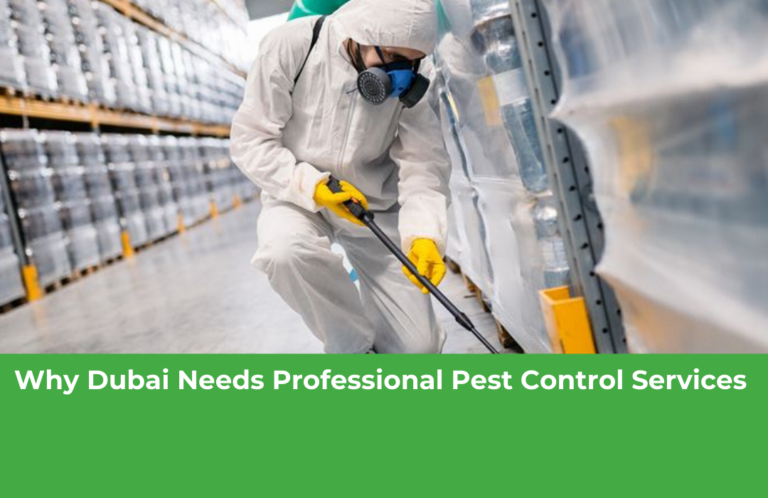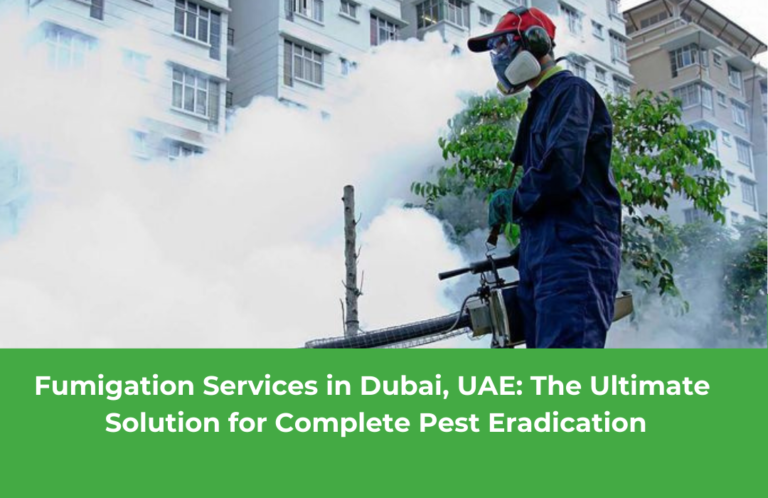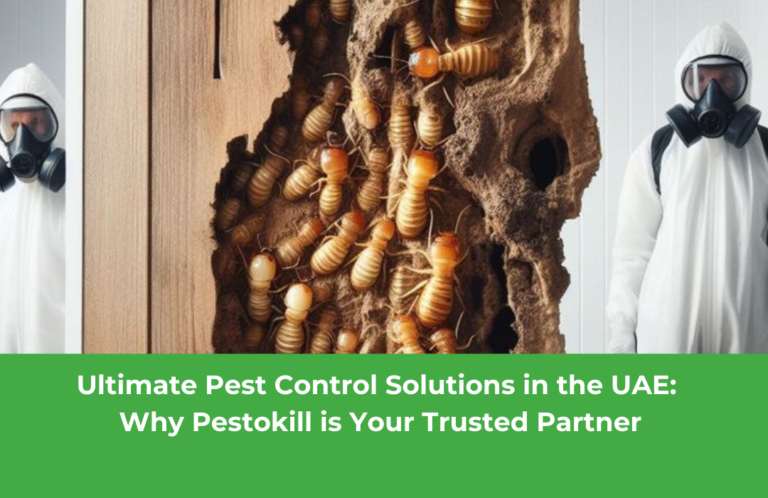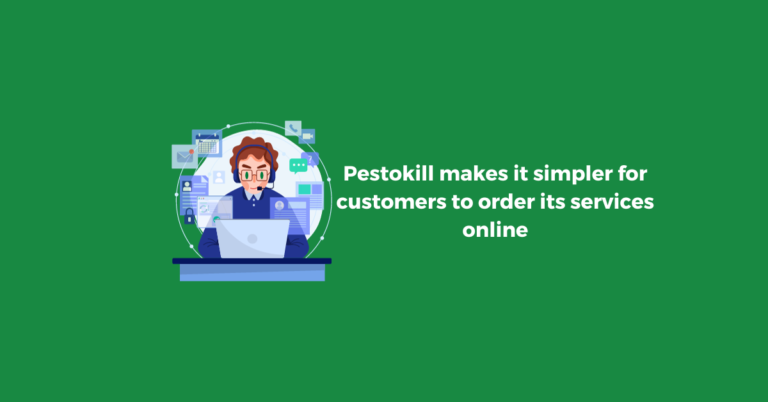The Complete Guide to Keeping Your Supermarket Pest-Free in Ajman
Pests can be a major issue for businesses in Ajman, affecting hygiene, damaging goods, and creating an unpleasant experience for customers. Supermarkets, in particular, are highly susceptible to pest infestations due to the presence of food products, waste materials, and high foot traffic. With the warm climate and urban environment, pests such as rodents, cockroaches,…
Pests can be a major issue for businesses in Ajman, affecting hygiene, damaging goods, and creating an unpleasant experience for customers. Supermarkets, in particular, are highly susceptible to pest infestations due to the presence of food products, waste materials, and high foot traffic. With the warm climate and urban environment, pests such as rodents, cockroaches, and insects can easily invade supermarkets. To maintain a clean and pest-free environment, it is essential to implement a comprehensive pest control strategy. This guide provides detailed steps to prevent, detect, and eliminate pest infestations in your supermarket.
Understanding Common Pests in Supermarkets
Before taking preventive measures, it’s important to know the common pests that might affect your supermarket:
- Rodents (Rats & Mice): Contaminate food, chew on packaging, and damage electrical wiring.
- Cockroaches: Spread bacteria and contaminate food surfaces, posing serious health risks.
- Flies: Carry diseases and pose a risk to food safety, especially in fresh produce and deli sections.
- Ants: Infest stored goods and food packaging, particularly in bakery and dry goods sections.
- Stored Product Pests (Weevils, Moths, Beetles): Attack grains, cereals, flour, and packaged dry goods.
- Termites: Cause structural damage to wooden shelving, pallets, and fixtures.
- Fruit Flies & Drain Flies: Thrive in moist areas and food waste, commonly found near fresh produce and drains.
Step-by-Step Guide to Prevent Pests in Your Supermarket
1. Maintain a Clean and Hygienic Environment
Cleanliness is the first and most effective defense against pests. Implement these hygiene practices:
- Daily cleaning: Sweep, mop, and disinfect all floors, especially in food storage and preparation areas.
- Regular surface cleaning: Wipe down shelves, counters, and checkout stations to remove food particles and spills.
- Proper garbage disposal: Use sealed trash bins and empty them frequently to avoid attracting pests.
- Food storage: Keep fresh produce, bakery items, and packaged foods in pest-proof containers where possible.
- Refrigeration management: Regularly clean and inspect refrigeration units to prevent mold and pest infestations.
2. Seal Entry Points to Prevent Infestation
Supermarkets have multiple entry points for pests. Prevent infestation by:
- Conducting regular inspections for holes, cracks, and gaps in walls, doors, and storage areas.
- Sealing all openings with caulk, steel wool, or other sealing materials.
- Installing door sweeps and air curtains at entrances to prevent flying insects from entering.
- Using fine mesh screens on vents, drains, and windows to block pests.
3. Implement Proper Waste Management
Supermarkets generate large amounts of waste that attract pests. Ensure proper waste management by:
- Using tightly sealed trash bins to prevent rodents and insects from accessing food waste.
- Emptying bins multiple times a day to avoid odors and pest attraction.
- Keeping waste bins far from store entrances and food storage areas.
- Cleaning and sanitizing waste disposal areas frequently.
4. Organize and Manage Storage Areas Efficiently
Stockrooms and bulk storage areas are prime hiding spots for pests. Prevent infestations by:
- Storing products on raised pallets to keep them off the floor.
- Keeping storage areas clean, dry, and well-ventilated.
- Rotating stock using the First-In, First-Out (FIFO) system to prevent old stock from attracting pests.
- Inspecting incoming inventory for signs of pest activity before stocking shelves.
5. Eliminate Water Sources
Standing water and leaks create a breeding ground for pests. Prevent water accumulation by:
- Fixing leaky pipes, faucets, and refrigeration units.
- Ensuring proper ventilation to reduce humidity levels.
- Keeping floor drains clean and using drain covers to prevent pest entry.
- Wiping down condensation from refrigeration units regularly.
6. Use Pest Control Methods
While prevention is key, occasional pest control treatments are necessary. Consider the following measures:
- Traps & Baits: Use rodent traps and insect baits in strategic locations to eliminate pests.
- Insect Light Traps (ILTs): Install ILTs in warehouse and storage areas to capture flying insects.
- Natural Repellents: Use bay leaves, vinegar, or citrus peels to deter certain pests.
- Chemical Treatments: Apply approved insecticides and rodenticides in compliance with food safety regulations.
7. Schedule Regular Pest Inspections and Professional Treatments
For persistent pest problems, hiring a professional pest control service in Ajman is the best solution. Professional pest controllers provide:
- Thorough inspections to detect hidden pest activity.
- Customized treatment plans based on the type and severity of infestation.
- Safe and eco-friendly pest control methods that comply with Ajman’s health regulations.
- Ongoing monitoring and prevention strategies to keep your supermarket pest-free.
8. Choosing a Reliable Pest Control Service in Ajman
If you need professional help, consider these reputable pest control companies in Ajman:
- Zam Zam Pest Control – Offers 24/7 services for rodents, cockroaches, bed bugs, and more.
- Rentokil Boecker® – Provides advanced pest management solutions for supermarkets and commercial spaces.
- Al Jazeerah Pest Control LLC – Specializes in residential and commercial pest control.
- Aim Premium Pest Control – Offers supermarket and warehouse pest management services.
- Al-Manama Pest Control – Provides eco-friendly pest control solutions for food businesses.
9. Educate and Train Your Staff on Pest Prevention
Your employees play a vital role in keeping your supermarket pest-free. Train them on:
- Identifying early signs of pest infestations.
- Proper sanitation and waste disposal practices.
- Reporting any pest sightings immediately for quick action.
- Storing and handling food products correctly to minimize pest risks.
10. Comply with Food Safety and Pest Control Regulations
Supermarkets in Ajman must comply with strict food safety standards. Ensure your store follows:
- Dubai Municipality and Ajman Health Department guidelines on pest control.
- HACCP (Hazard Analysis and Critical Control Points) standards for food safety.
- Regular pest control audits to maintain compliance with hygiene standards.
- Proper documentation of pest control treatments for regulatory inspections.
Conclusion
Keeping your supermarket pest-free in Ajman requires a proactive and consistent approach. By maintaining cleanliness, sealing entry points, managing waste, and using effective pest control measures, you can create a hygienic and safe shopping environment for customers. For persistent infestations, partnering with a professional pest control service ensures long-term protection against pests.
By implementing these guidelines, you can safeguard your supermarket from pest-related issues, maintain compliance with food safety regulations, and uphold a strong reputation in Ajman’s competitive market.







